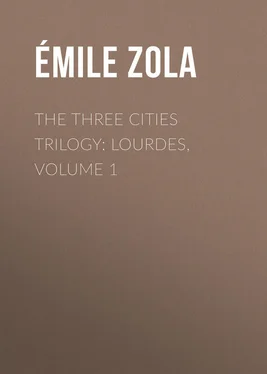Émile Zola - The Three Cities Trilogy - Lourdes, Volume 1
Здесь есть возможность читать онлайн «Émile Zola - The Three Cities Trilogy - Lourdes, Volume 1» — ознакомительный отрывок электронной книги совершенно бесплатно, а после прочтения отрывка купить полную версию. В некоторых случаях можно слушать аудио, скачать через торрент в формате fb2 и присутствует краткое содержание. Жанр: literature_19, foreign_antique, foreign_prose, на английском языке. Описание произведения, (предисловие) а так же отзывы посетителей доступны на портале библиотеки ЛибКат.
- Название:The Three Cities Trilogy: Lourdes, Volume 1
- Автор:
- Жанр:
- Год:неизвестен
- ISBN:нет данных
- Рейтинг книги:4 / 5. Голосов: 1
-
Избранное:Добавить в избранное
- Отзывы:
-
Ваша оценка:
- 80
- 1
- 2
- 3
- 4
- 5
The Three Cities Trilogy: Lourdes, Volume 1: краткое содержание, описание и аннотация
Предлагаем к чтению аннотацию, описание, краткое содержание или предисловие (зависит от того, что написал сам автор книги «The Three Cities Trilogy: Lourdes, Volume 1»). Если вы не нашли необходимую информацию о книге — напишите в комментариях, мы постараемся отыскать её.
The Three Cities Trilogy: Lourdes, Volume 1 — читать онлайн ознакомительный отрывок
Ниже представлен текст книги, разбитый по страницам. Система сохранения места последней прочитанной страницы, позволяет с удобством читать онлайн бесплатно книгу «The Three Cities Trilogy: Lourdes, Volume 1», без необходимости каждый раз заново искать на чём Вы остановились. Поставьте закладку, и сможете в любой момент перейти на страницу, на которой закончили чтение.
Интервал:
Закладка:
They had said their chaplets at Juvisy; and six o'clock was striking, and they were rushing like a hurricane past the station of Bretigny, when Sister Hyacinthe stood up. It was she who directed the pious exercises, which most of the pilgrims followed from small, blue-covered books.
"The Angelus, my children," said she with a pleasant smile, a maternal air which her great youth rendered very charming and sweet.
Then the "Aves" again followed one another, and were drawing to an end when Pierre and Marie began to feel interested in two women who occupied the other corner seats of their compartment. One of them, she who sat at Marie's feet, was a blonde of slender build and /bourgeoise/ appearance, some thirty and odd years of age, and faded before she had grown old. She shrank back, scarcely occupying any room, wearing a dark dress, and showing colourless hair, and a long grief-stricken face which expressed unlimited self-abandonment, infinite sadness. The woman in front of her, she who sat on the same seat as Pierre, was of the same age, but belonged to the working classes. She wore a black cap and displayed a face ravaged by wretchedness and anxiety, whilst on her lap she held a little girl of seven, who was so pale, so wasted by illness, that she scarcely seemed four. With her nose contracted, her eyelids lowered and showing blue in her waxen face, the child was unable to speak, unable to give utterance to more than a low plaint, a gentle moan, which rent the heart of her mother, leaning over her, each time that she heard it.
"Would she eat a few grapes?" timidly asked the lady, who had hitherto preserved silence. "I have some in my basket."
"Thank you, madame," replied the woman, "she only takes milk, and sometimes not even that willingly. I took care to bring a bottleful with me."
Then, giving way to the desire which possesses the wretched to confide their woes to others, she began to relate her story. Her name was Vincent, and her husband, a gilder by trade, had been carried off by consumption. Left alone with her little Rose, who was the passion of her heart, she had worked by day and night at her calling as a dressmaker in order to bring the child up. But disease had come, and for fourteen months now she had had her in her arms like that, growing more and more woeful and wasted until reduced almost to nothingness. She, the mother, who never went to mass, entered a church, impelled by despair to pray for her daughter's cure; and there she had heard a voice which had told her to take the little one to Lourdes, where the Blessed Virgin would have pity on her. Acquainted with nobody, not knowing even how the pilgrimages were organised, she had had but one idea – to work, save up the money necessary for the journey, take a ticket, and start off with the thirty sous remaining to her, destitute of all supplies save a bottle of milk for the child, not having even thought of purchasing a crust of bread for herself.
"What is the poor little thing suffering from?" resumed the lady.
"Oh, it must be consumption of the bowels, madame! But the doctors have names they give it. At first she only had slight pains in the stomach. Then her stomach began to swell and she suffered, oh, so dreadfully! it made one cry to see her. Her stomach has gone down now, only she's worn out; she has got so thin that she has no legs left her, and she's wasting away with continual sweating."
Then, as Rose, raising her eyelids, began to moan, her mother leant over her, distracted and turning pale. "What is the matter, my jewel, my treasure?" she asked. "Are you thirsty?"
But the little girl was already closing her dim eyes of a hazy sky-blue hue, and did not even answer, but relapsed into her torpor, quite white in the white frock she wore – a last coquetry on the part of her mother, who had gone to this useless expense in the hope that the Virgin would be more compassionate and gentle to a little sufferer who was well dressed, so immaculately white.
There was an interval of silence, and then Madame Vincent inquired: "And you, madame, it's for yourself no doubt that you are going to Lourdes? One can see very well that you are ill."
But the lady, with a frightened look, shrank woefully into her corner, murmuring: "No, no, I am not ill. Would to God that I were! I should suffer less."
Her name was Madame Maze, and her heart was full of an incurable grief. After a love marriage to a big, gay fellow with ripe, red lips, she had found herself deserted at the end of a twelvemonth's honeymoon. Ever travelling, following the profession of a jeweller's bagman, her husband, who earned a deal of money, would disappear for six months at a stretch, deceive her from one frontier to the other of France, at times even carrying creatures about with him. And she worshipped him; she suffered so frightfully from it all that she had sought a remedy in religion, and had at last made up her mind to repair to Lourdes, in order to pray the Virgin to restore her husband to her and make him amend his ways.
Although Madame Vincent did not understand the other's words, she realised that she was a prey to great mental affliction, and they continued looking at one another, the mother, whom the sight of her dying daughter was killing, and the abandoned wife, whom her passion cast into throes of death-like agony.
However, Pierre, who, like Marie, had been listening to the conversation, now intervened. He was astonished that the dressmaker had not sought free treatment for her little patient. The Association of Our Lady of Salvation had been founded by the Augustine Fathers of the Assumption after the Franco-German war, with the object of contributing to the salvation of France and the defence of the Church by prayer in common and the practice of charity; and it was this association which had promoted the great pilgrimage movement, in particular initiating and unremittingly extending the national pilgrimage which every year, towards the close of August, set out for Lourdes. An elaborate organisation had been gradually perfected, donations of considerable amounts were collected in all parts of the world, sufferers were enrolled in every parish, and agreements were signed with the railway companies, to say nothing of the active help of the Little Sisters of the Assumption and the establishment of the Hospitality of Our Lady of Salvation, a widespread brotherhood of the benevolent, in which one beheld men and women, mostly belonging to society, who, under the orders of the pilgrimage managers, nursed the sick, helped to transport them, and watched over the observance of good discipline. A written request was needed for the sufferers to obtain hospitalisation, which dispensed them from making the smallest payment in respect either of their journey or their sojourn; they were fetched from their homes and conveyed back thither; and they simply had to provide a few provisions for the road. By far the greater number were recommended by priests or benevolent persons, who superintended the inquiries concerning them and obtained the needful papers, such as doctors' certificates and certificates of birth. And, these matters being settled, the sick ones had nothing further to trouble about, they became but so much suffering flesh, food for miracles, in the hands of the hospitallers of either sex.
"But you need only have applied to your parish priest, madame," Pierre explained. "This poor child is deserving of all sympathy. She would have been immediately admitted."
"I did not know it, monsieur l'Abbe."
"Then how did you manage?"
"Why, Monsieur l'Abbe, I went to take a ticket at a place which one of my neighbours, who reads the newspapers, told me about."
She was referring to the tickets, at greatly reduced rates, which were issued to the pilgrims possessed of means. And Marie, listening to her, felt great pity for her, and also some shame; for she who was not entirely destitute of resources had succeeded in obtaining /hospitalisation/, thanks to Pierre, whereas that mother and her sorry child, after exhausting their scanty savings, remained without a copper.
Читать дальшеИнтервал:
Закладка:
Похожие книги на «The Three Cities Trilogy: Lourdes, Volume 1»
Представляем Вашему вниманию похожие книги на «The Three Cities Trilogy: Lourdes, Volume 1» списком для выбора. Мы отобрали схожую по названию и смыслу литературу в надежде предоставить читателям больше вариантов отыскать новые, интересные, ещё непрочитанные произведения.
Обсуждение, отзывы о книге «The Three Cities Trilogy: Lourdes, Volume 1» и просто собственные мнения читателей. Оставьте ваши комментарии, напишите, что Вы думаете о произведении, его смысле или главных героях. Укажите что конкретно понравилось, а что нет, и почему Вы так считаете.












